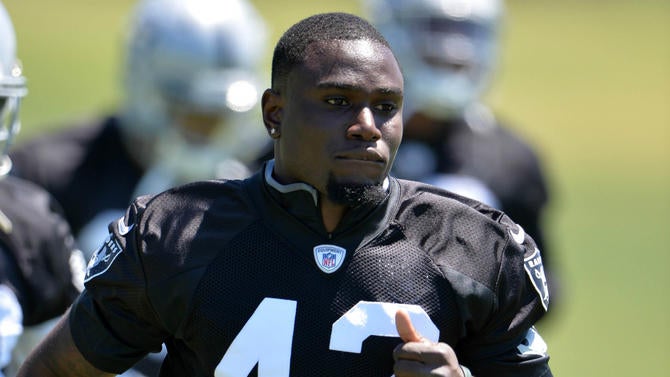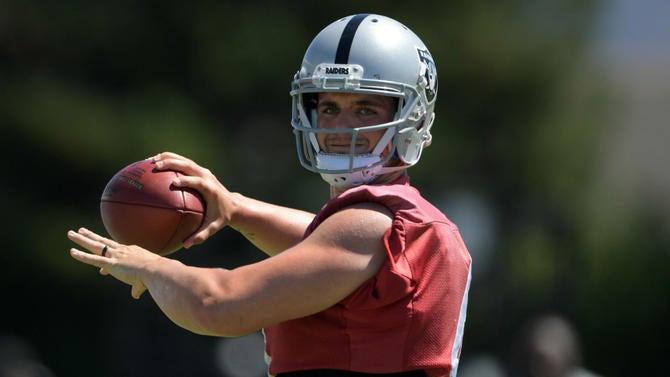Running the Oakland Raiders was one of the NFL's least desirable upper-level front office jobs when Reggie McKenzie was hired in January 2012 as general manager despite an 8-8 finish in 2011. The record was misleading, because iconic owner Al Davis was constantly in search of a quick fix as a way back to the franchise's glory days of the mid-'70s and early '80s, which included three Super Bowls in an eight-year span.
McKenzie was essentially operating with one hand tied behind his back initially because of the previous regime's penchant for overpaying veteran players without any long-term vision and a dearth of early-round draft picks. A major focus was on cleaning up a salary cap mess that couldn't be fixed overnight. McKenzie engaged in this two-year process through a roster purge, which resulted in the Raiders being one of the NFL's least talented teams. Oakland having in excess of $55 million of dead money, salary cap charges for players no longer on the roster, in 2013 was unprecedented.
Many assumed McKenzie was on the hot seat when his handpicked head coach, Dennis Allen, was fired after an 0-4 start to the 2014 season, even though Mark Davis, who assumed ownership when his father passed away, had preached patience. The Raiders only had an 8-28 record at this juncture in McKenzie's tenure. McKenzie's curious approach to free agency in 2014 had people questioning his capability. A bunch of older players past their prime were signed, and nothing better signals the growing pains of the early days than McKenzie wasting money on Matt Flynn and Matt Schaub in attempt to fix the quarterback void left when Carson Palmer was traded to the Cardinals.
McKenzie may not have survived if Jon Gruden had been willing to leave the broadcast booth for a second stint as Raiders coach or Jim Harbaugh had been interested in staying in the NFL instead of returning to his alma mater. Harbaugh likely would have insisted on total control of football operations after an acrimonious relationship with general manager Trent Baalke while coaching the 49ers.
McKenzie masters the rebuild
McKenzie's saving grace may have been a stellar 2014 NFL Draft. Foundational pieces such as defensive end/linebacker Khalil Mack, quarterback Derek Carr and guard Gabe Jackson were selected in the first three rounds. McKenzie appears to have hit another home run in the draft with 2015 fourth-overall pick wide receiver Amari Cooper.
The Raiders turned the corner in 2015, with first-year head coach Jack Del Rio winning seven games, including a victory over the Super Bowl 50 champion Denver Broncos. Oakland became a more attractive destination for marquee free agents during the offseason because of this step forward.
Armed with almost $60 million in cap room, the Raiders made Kelechi Osemele the NFL's highest paid guard by a considerable margin on a five-year, $58.5 million deal (worth up to $60 million through incentives) with $25.4 million fully guaranteed to fortify an already solid offensive line. Outside linebacker Bruce Irvin and cornerback Sean Smith were also priority signings to help shore up a defense that ranked 22nd in total defense and 26th against the pass last season.
The defense continued to be a priority in the draft. The first three selections (safety Karl Joseph, defensive tackle Jihad Ward and defensive end Shilique Calhoun) were on that side of the ball.

McKenzie's efforts recently earned him in a four-year contract extension. He was in the last year of the contract he signed to leave his post as director of football operations of the Green Bay Packers for the Raiders.
The improvement in 2015 and infusion of talent has created renewed optimism about the franchise. The Raiders are a trendy preseason pick to make the playoffs for the first time since 2002. Our own Jason La Canfora predicted the Raiders would win the AFC West back in May. Pro Football Focus projects the Raiders to go 11-5 this season. The Raiders have the potential to replace the Broncos as the team to beat in the division for the foreseeable future.
A new set of challenges await the Raiders even if expectations aren't met this season. The Raiders don't have a lot of time to take advantage of their best young players being tremendous bargains while on their rookie contracts, which is what the Seattle Seahawks were able to do in their rise to becoming perennial Super Bowl contenders. The 2014 draft class will be eligible for extensions after the conclusion of the 2016 regular season.
Managing a Seahawks situation
The Raiders have been proactive in extending the contracts of core players well in advance of free agency. Carr will likely be a higher signing priority next offseason than Mack. 2017 is Carr's contract year, while Mack won't be in his contract year until 2018 since first-round picks are subject to a fifth-year option, which the Raiders will surely exercise.
Carr developed an instant rapport with his new wide receivers, Cooper and free-agent addition Michael Crabtree, last season. The connection is only going to get better with another year together. Carr's late season slide over the last five games coincided with a foot injury limiting Cooper's effectiveness. In these games, Carr only completed 56.4 percent of passes (110 of 195 attempts) with eight touchdown and seven interceptions for a 71.1 passer rating. He should easily join the $20 million per year quarterback club sometime before the start of the 2017 season, provided last season's slump is just a blip on the radar screen.
Jackson could also be in line for a new deal as well, assuming he makes a successful transition from right guard to left guard. The Raiders would have the NFL's highest-paid guard tandem, considering the going rate for upper echelon guards, excluding Osemele, is $8 million per year with over $20 million in guarantees.
The Raiders are likely going to have some of the same issues as Seattle in making the transition from having a low-paid quarterback to a high-paid one. Seattle had to make some difficult choices on which players to retain. Their ability to assemble a deep roster has been compromised, and a premium is being placed on the coaching staff's ability to develop draft and talent.
One situation to keep an eye on is that of Latavius Murray. Although Murray became Oakland's first 1,000-yard rusher since Darren McFadden, he was less effective as the season progressed. His yards per carry went from 4.8 in the first half of the season to 3.3 over the last eight games.
Murray is in the final year of his rookie contract. The $6.5 million per year with $14 million fully guaranteed Lamar Miller received from the Texans could become Murray's salary floor on his next contract, provided he consistently performs more like he did in the first half of last year. Starting over by finding a running back in the 2017 draft, which should be deep for ball carriers, could be an appealing less-expensive option with more inconsistency from Murray or if he prices himself out of Oakland with a great season.

The Raiders will have additional dynamic that few teams face as early as 2017 with a quarterback on a lucrative contract while having one of the league's highest-paid non-quarterbacks. Among the seven highest-paid non-quarterbacks by average yearly salary, which are Von Miller (Broncos), Ndamukong Suh (Dolphins), Muhammad Wilkerson (Jets), Fletcher Cox (Eagles), Olivier Vernon (Giants), Justin Houston (Chiefs) and J.J. Watt (Texans), only the Giants also have a quarterback, Eli Manning, making at least $20 million per year.
Miller's recent six-year, $114.5 million contract with a non-quarterback record $70 million in overall guarantees signed, which makes him the NFL's highest-paid non-quarterback at $19,083,333 per year, will likely serve as a salary floor for Mack. He appears to be just scratching the surface of his talent despite becoming the first player in NFL history to earn first-team All-Pro honors at two different positions during the same season (defensive end and outside linebacker) in 2015. It wouldn't be a surprise if Mack became the NFL's first $20 million per year non-quarterback with at least $75 million in guarantees whether he signs a new deal in 2017 or 2018.
The new Raider Way
It should be an obstacle the Raiders can overcome. The Raiders won't be in any danger of getting back into the cap problems that plagued them before McKenzie took over with new Carr and Mack deals because of their method of structuring contracts. A "pay as you go" model has been utilized with practically all veteran signings. A player's cash and salary cap numbers are the same in each contract year because he is receiving salary guarantees instead of a signing bonus with the pay-as-you-go structure.
The first contract year usually consists of a fully-guaranteed base salary and a roster bonus due a few days after signing. The second year in pay-as-you-go contracts may contain a fully-guaranteed base and a conditionally-guaranteed early roster bonus. There may also be conditional guarantees in the third year.
Deals with this structure have higher cap numbers initially because of the absence of a signing bonus. Rodney Hudson's five-year, $44.5 million contract, which briefly made him the NFL's highest-paid center in 2015, is a perfect illustration of this concept. His 2015 cap number was $13 million. It drops to $7.7 million and $6.85 million in 2016 and 2017 before rising again in the final two years.
"Pay as you go" is a relatively new concept and isn't embraced by most NFL teams. Besides the Raiders, the Jaguars and Buccaneers are the most frequent proponents of this structure but to a lesser degree. The Buccaneers adopted the structure first during Mark Dominik's tenure as general manager but their biggest contracts, as do Jacksonville's, now contain relatively modest signing bonuses.
The Raiders are projected to have $45 million to $50 million in 2017 cap room as long as the salary cap continues its approximately 8 percent annual increase of the last couple of years. Continued growth at this rate will put the 2017 cap at approximately $168 million. This will allow the Raiders to absorb an extremely high cap number in 2017 for Carr, which could be approaching $25 million, using the pay-as-you-go structure instead of his current 2017 cap number of slightly over $1.7 million.
The Raiders should have more cap flexibility on a year to year basis than most teams. The lack of signing bonus proration means there won't be any dead money if a player is released during the latter years of the deal once the guarantees have expired (provided that his contract hasn't been restructured). For example, Oakland can release defensive tackle Dan Williams, who has fallen behind Justin Ellis on this season's initial depth chart, from the four-year, $25 million contract he signed last offseason without cap impunity in 2017 when he no longer has guarantees. $4.5 million of cap room would be gained by removing his non-guaranteed salary from Oakland's books. The same holds true for virtually all Oakland deals once the guarantees are over, which is usually after the first two contract years.
Tampa Bay created almost $29.5 million of cap space in 2014 with minimal dead money that year before the start of free agency by releasing several veterans, including Darrelle Revis, because of this contract approach. It's conceivable that the Raiders will be able to do something similar if necessary to retool the roster annually with pay-as-you-as-go contracts. Roster churning where the Raiders consistently have the option to be major players in free agency could become standard operating procedure.
The Raiders could become a franchise for other teams to emulate in next few years, particularly from a cap management standpoint, if the AFC West quickly becomes their domain as expected. This may be difficult for some to comprehend given Oakland's almost decade and a half of futility.
















